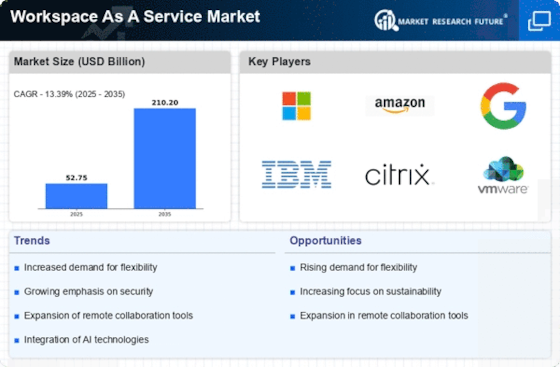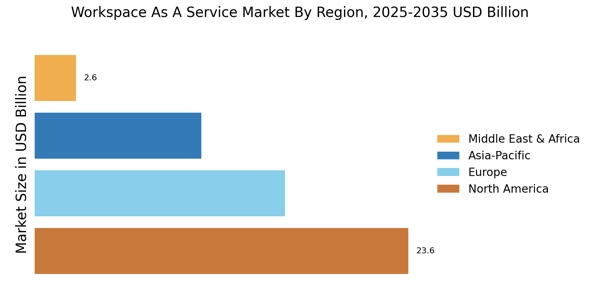Rising Demand for Flexible Workspaces
The Workspace As A Service Market experiences a notable increase in demand for flexible workspaces. Organizations are increasingly recognizing the need for adaptable environments that cater to diverse employee preferences. This shift is driven by the desire to enhance productivity and employee satisfaction. According to recent data, approximately 70% of companies are considering flexible workspace solutions to accommodate their workforce. This trend indicates a significant transformation in how businesses approach office space, moving away from traditional fixed layouts. The Workspace As A Service Market is thus positioned to benefit from this evolving landscape, as companies seek to optimize their real estate investments while providing employees with the flexibility they desire.
Increased Focus on Employee Well-being
The Workspace As A Service Market is increasingly influenced by a heightened focus on employee well-being. Organizations are recognizing that a healthy work environment directly impacts productivity and employee retention. As a result, many companies are investing in workspace solutions that prioritize mental and physical health. This includes incorporating wellness features such as ergonomic furniture, natural lighting, and access to green spaces. Recent studies indicate that companies that prioritize employee well-being experience a 25% increase in productivity. Consequently, the Workspace As A Service Market is adapting to these demands by offering solutions that foster a supportive and health-conscious work environment.
Emphasis on Collaboration and Innovation
The Workspace As A Service Market is significantly shaped by an emphasis on collaboration and innovation. Modern organizations are increasingly aware that fostering a collaborative culture is essential for driving creativity and innovation. As such, there is a growing demand for workspace solutions that facilitate teamwork and knowledge sharing. This trend is reflected in the design of workspaces, which are now being tailored to encourage interaction among employees. Research indicates that companies with collaborative work environments see a 15% increase in innovation output. Therefore, the Workspace As A Service Market is evolving to provide environments that not only support collaboration but also enhance the overall creative process within organizations.
Cost Efficiency and Operational Flexibility
Cost efficiency remains a pivotal driver in the Workspace As A Service Market. Organizations are increasingly seeking ways to reduce overhead costs while maintaining operational flexibility. By adopting workspace as a service models, companies can minimize capital expenditures associated with traditional office spaces. This approach allows for a more agile response to changing business needs, enabling organizations to scale their operations up or down as required. Data suggests that businesses utilizing workspace as a service can achieve up to 30% savings on real estate costs. This financial incentive is compelling for many organizations, driving the growth of the Workspace As A Service Market as companies strive for greater efficiency.
Technological Advancements in Workspace Solutions
Technological innovations play a crucial role in shaping the Workspace As A Service Market. The integration of advanced technologies such as artificial intelligence, cloud computing, and the Internet of Things is revolutionizing workspace management. These technologies enable organizations to streamline operations, enhance collaboration, and improve overall efficiency. For instance, the implementation of AI-driven analytics allows companies to optimize space utilization and reduce operational costs. As a result, the Workspace As A Service Market is witnessing a surge in demand for tech-enabled solutions that facilitate seamless communication and collaboration among remote and on-site teams. This trend suggests a promising future for service providers who can leverage technology to meet evolving client needs.

















